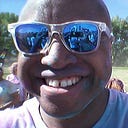Member-only story
I Am the Good Son, Chapter 10
December, 2013
It was time for the eulogy to be given by the prodigal son, as my father once called me — it was after I’d come back home after having spent three months traveling through the country, accruing expenses on a credit card, which contributed to my decision to file for bankruptcy a little more than eight years before. I approached the lectern, then took my place behind it.
Dad was encased in the glittering silver coffin to the left of me. He’d been kept in the funeral home’s freezer for six weeks as a means to prevent his body from desiccating. It looked like they’d put some sort of concealer on his face. His blackening fingers were interlaced atop his sternum. He was still handsome. My heart was pounding as I gently placed the three paged document on top of the lectern.
In writing this eulogy, I’d broken a long-standing rule. Eulogies were supposed to be short expressions of praise, a one-page document that contained about five-hundred words or so, but I didn’t care about that.
There was a lot that I needed to say about the man who’d raised me. And I was eager to educate and illuminate the people in the audience, especially my father’s countrymen and women — my dad had been born in Nigeria — , some of whom were still skeptical about the son who struggled to adhere to long-standing traditions.
